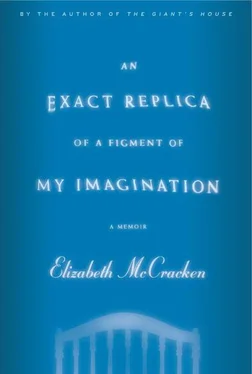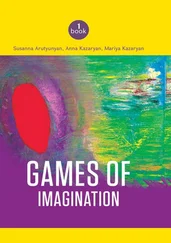We lived an hour away from the city and that grim hospital, in an enormous rented farmhouse with a converted attached barn, an oddball structure called Savary, which had at one point been a home for single mothers and their troubled children. The house had eight bedrooms and as many bathrooms and a vast haunted space upstairs that the landlady referred to as the Dormitory, which smelled of disemboweled teddy bears and tear-stained twin mattresses. Downstairs, in the old-barn part of the house, sofas were backed up against old cattle-feed troughs. Savary was a certain species of French house, the preposterous property bought by an English person dreaming of les bonheurs and high summer rents; we paid almost nothing for October through May, when it would have stood empty anyhow. Everything came from Ikea: sheets, drinking glasses, light fixtures, beds, kitchen appliances. The walls were stone, and the floors cold tile.
In my memory the house is gothic, all corridors and abandoned bedrooms. My office was upstairs, off what was described in the inventory as the Second Lounge but really was a space too lumpen to be a hallway and too windowless and eave-cramped to be a room. Getting to my office after dark involved crossing a series of spaces whose light switches were right where I didn’t need them. I almost never went. Instead, I stayed by the fire in the front room. We decided we would be hardy: we left the furnace off to save money and wrote, Cratchit-like, in hats and gloves. The place was full of mice. I could even hear them skittering underneath the tub when I bathed. Sometimes we heard a worse noise: according to Maud, the young Irishwoman hired to look after the property, there was a pine marten living in the eaves. I didn’t even know what a pine marten was, but in my gloves and hat I imagined a raccoonish, foxish Jacob Marley, rattling his chains above our bedroom to make us feel fully Dickensian. I hated that animal, though I never saw it.
In fact, from where I sit now — New York State, the spring of 2007 — everything about our winter in Savary feels dire: the house dirty, the Anglophone friends we made perpetually and depressingly drunk and broke, the language barrier alienating. A single sentence in French can make me sad. Every now and then I will suddenly think, What was the name of the next village over, the one with the covered market in the middle, what was the name of that restaurant we used to go to, and I find I can’t remember, the information’s gone like a pulled tooth, though my brain will keep poking at the empty spot.
What a terrible time that all was, I’ll think.
My memory is a goddamn liar. It can only see France — or at least those seven months in the southwestern countryside — through the calamity. If you’d asked before April 27, 2006, I would have said: This is the happiest time of my life. That’s why I wrote down that sentence in the hospital, This is the happiest story in the world with the saddest ending . It was very strange to have been so happy so recently, and I felt that if I puzzled it over enough I might be able to find my way back — not to experience it again, of course, but to conjure up the smell on the hem of an article of clothing, to touch in some abstract way something that had innocently, casually touched my happiness, since there would be (he was stillborn) nothing literal for me to touch.
But now there it is when I wipe the smudge away: happiness. I was two months pregnant when we moved to Savary. We’d spent the nine months before that in Paris. For three years we’d split our time between Iowa, where we taught and earned money, and Europe, where we wrote and spent it: Paris twice, Ireland, Berlin, Denmark. People told me, “I’d love to have your life,” and I would always say, “But then you’d have to accept my standard of living.” We didn’t own a house, a car, not even a sofa. We spent our money on souvenir busts and cheap red wine.
Savary was one more adventure. Yes, the house was dark, but it was agreeably hilarious. “We’re living in an unwed mothers’ home,” I told my friends. “We have eight bathrooms and two kitchens and a single possible pine marten.” The house was surrounded by farmland and vineyards, cows out some windows and horses out others, and a vast patio off the summer kitchen with a view of Duras, the nearby village, and its medieval hill-set château. The château was an enormous plain castle that looked, in good weather, like the home of seven beautiful princesses and one befuddled king, and in bad weather like the keep of a brooding, evil, terribly attractive beast.
I loved being pregnant. Whatever hormones had shaken together in my bloodstream, it was an agreeable cocktail. I devoted myself to gestating — I didn’t write much, but that didn’t bother me. Edward cooked and cleaned and tucked me into bed. I rubbed my stomach and loved my husband profoundly. I had the sense that these last months as a twosome were as important as our upcoming months as a threesome: they felt like part of someone’s happy childhood. What fun it would be to tell our kid where his parents had spent his gestation and birth. In the spring, sheep and lambs, cows and calves, studded the hills, and I regarded them. I felt stupidly, sentimentally mammalian.
After the baby died, I told Edward over and over again that I didn’t want to forget any of it: the happiness was real, as real as the baby himself, and it would be terrible, unforgivable, to forget it. His entire life had turned out to be the forty-one weeks and one day of his gestation, and those days were happy. We couldn’t pretend that they weren’t. It would be like pretending that he himself was a bad thing, something to be regretted, and I didn’t. I would have done the whole thing over again even knowing how it would end.
(Would I really? It’s a kind of maternal puzzle I can’t get at even now: he isn’t here, and yet how can I even consider wishing him away? I can’t love and regret him both. He isn’t here, but now someone else is, this thrilling splendiferous second baby, and like any mother I can’t imagine taking the smallest step from the historical path that led me here, to this one, to such a one.)
No matter how I vowed to hold on to the happiness of the pregnancy, it was impossible, such a solitary pastime. When your child dies you cannot talk about how much you loved being pregnant. You have to give up the stories about the funny French gym you went to, where the women kissed hello while on treadmills and the gym owner shook your hand and said, “Ça va? Et le bébé?” You must retire the anecdotes of meeting a pair of Mormons in Bergerac, the comic complaints of how impossible it is for a pregnant person to eat in a French restaurant, your run-ins with French lab workers who refused — pen poised over a cup of your urine, one eyebrow raised skeptically — to believe there was such a thing as a married woman who kept her maiden name. You can’t list all the funny names you and your husband came up with for the kid, laughing in bed, late at night. You will lose nine months of your history along with all the other things you’ve lost.
I had just stepped over the border from happy pregnancy to grief, but I could still see that better, blither country, could smell the air over my shoulder, could remember my fluency there, the dumb jokes, the gestures, the disappointing cuisine, the rarefied climate. I knew already I could never go back, not then, not for any future pregnancy (should I be so lucky).
Of course I wanted to remember what it was like! It was all I had.
Now it’s all miles away. Everything’s muddled together. At some point I imagined a kind of time — I don’t know whether I got this idea from science or science fiction, not being much interested in either — that split into two or more directions when the baby died: on one track he lived and we took him home and somewhere in the universe at this moment we have a one-year-old baby and a newborn and are ignorant, exhausted, cheery (or maybe only the first two); on the other track, the one I accidentally took, he died, and we left France. But time changed backwards, too, and now, no matter what, every single day of my first pregnancy, when I was laughing till I was paralytic at my own jokes about what to name the baby, when I was addressing fond monologues to my stomach as I drove a horrific old Ford Escort through the French countryside, he was already dead, and France was already culpable, and our hearts were already broken.
Читать дальше












